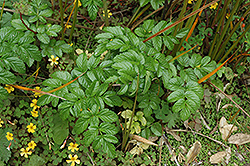Plant Height: 3 feet
Flower Height: 4 feet
Spread: 24 inches
Sunlight:
![]()
![]()
Hardiness Zone: 4
Description:
In the first year the plant will develop a clump of rich, glossy green leaves; will flower and seed in the second season; not an edible species of angelica; makes a unique statement in the garden
Ornamental Features
Angelica features showy clusters of white round flowers with creamy white overtones at the ends of the stems from early to late summer. Its glossy oval bipinnately compound leaves remain dark green in color throughout the season.
Landscape Attributes
Angelica is an open herbaceous biennial with an upright spreading habit of growth. It brings an extremely fine and delicate texture to the garden composition and should be used to full effect.
This plant will require occasional maintenance and upkeep, and should be cut back in late fall in preparation for winter. It is a good choice for attracting bees and butterflies to your yard. Gardeners should be aware of the following characteristic(s) that may warrant special consideration;
- Insects
- Disease
Angelica is recommended for the following landscape applications;
- Mass Planting
- Border Edging
- General Garden Use
- Naturalizing And Woodland Gardens
Planting & Growing
Angelica will grow to be about 3 feet tall at maturity extending to 4 feet tall with the flowers, with a spread of 24 inches. It grows at a medium rate, and tends to be biennial, meaning that it puts on vegetative growth the first year, flowers the second, and then dies.
This plant does best in full sun to partial shade. It does best in average to evenly moist conditions, but will not tolerate standing water. It is not particular as to soil type or pH. It is somewhat tolerant of urban pollution. This species is not originally from North America.
